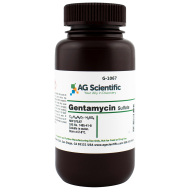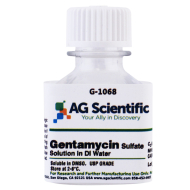Gentamycin Sulfate is one of many broad-spectrum, cell culture antibiotics that are non-toxic to viruses and mammalian cells at antibacterial levels.
What is Gentamycin Sulfate?
Gentamycin Sulfate is a broad-spectrum antibiotic used to treat several types of bacterial infections such as bone infections, endocarditis, pelvic inflammatory disease, meningitis, pneumonia, urinary tract infections, and sepsis among others. It is useful for long-term virus and tissue culture studies by inhibiting protein synthesis via binding to L6 protein of 50S ribosomal subunit.
What is the mechanism of action of Gentamycin?
Gentamicin is a bactericidal antibiotic that works by irreversibly binding the 30S subunit of the bacterial ribosome, interrupting protein synthesis. This mechanism of action is similar to other aminoglycosides.
What is the chemical makeup of Gentamycin?
Gentamycin Sulfate is composed of a number of related gentamicin components and fractions which have varying degrees of antimicrobial potency. The main components of gentamicin include members of the gentamicin C complex: gentamicin C1, gentamicin C1a, and gentamicin C2 which compose approximately 80% of gentamicin and have been found to have the highest antibacterial activity. Gentamicin A, B, X, and a few others make up the remaining 20% of gentamicin and have lower antibiotic activity than the gentamicin C complex.
The exact composition of a given sample or lot of gentamicin is not well defined, and the level of gentamicin C components or other components in gentamicin may differ from lot-to-lot depending on the gentamicin manufacturer or manufacturing process. Because of this lot-to-lot variability, it can be difficult to study various properties of gentamicin including pharmacokinetics and microorganism susceptibility if there is an unknown combination of chemically related but different compounds.
What is the Gentamycin's indications?
Gentamycin (in 0.9% sodium chloride injection) is indicated in the treatment of patients with the following serious infections: bacteremia/septicemia, respiratory tract infections, urinary tract infections, bone, skin and soft tissue infections (including burns), and intra-abdominal infections, including peritonitis.
Is there a clinical use of Gentamycin?
Gentamycin is clinically effective in serious infections caused by susceptible strains of the following bacteria: Pseudomonas aeruginosa, Proteus species (indole negative and indole positive), Escherichia coli, Klebsiella pneumoniae, Enterobacter aerogenes, Serratia marcescens and Staphylococcus species (methicillin-susceptible strains only)*. Gentamycin may be considered for the treatment of Staphylococcus infections when other less potentially toxic drugs are contraindicated and bacterial susceptibility tests and clinical judgment indicates its use.
To reduce the development of drug-resistant bacteria and maintain the effectiveness of gentamicin and other antibacterial drugs, Gentamycin should be used only to treat infections that are proven or suspected to be caused by susceptible bacteria. When culture and susceptibility information are available, they should be considered in selecting or modifying antibacterial therapy. In the absence of such data, local epidemiology and susceptibility patterns may contribute to the empiric selection of therapy.
What is the molecular weight of Gentamycin Sulfate?
The molecular weight of gentamycin sulfate is 575.67 g/mol.
How do you store and handle Gentamycin?
Gentamycin should be store at 2-8°C. Warning! Gentamycin is toxic and may be a carcinogenic and teratogenic. In general, in order to maintain stability, store and handle product according to vendors instructions.
What is the appearance and color of Gentamycin?
It is a white to off-white powder.
What is Gentamycins melting point?
Gentamycin Sulfate's melting point is 102-108°C.
Additional Reading
-
Top Carbenicillin Antiobiotic FAQs
-
The CRISPR Cas9 System: A War Against Antibiotic Resistance
-
Beta-Lactamase-BS (broad-spectrum) Inactivates Beta-Lactams
-
Applications of Beta-Lactamase

